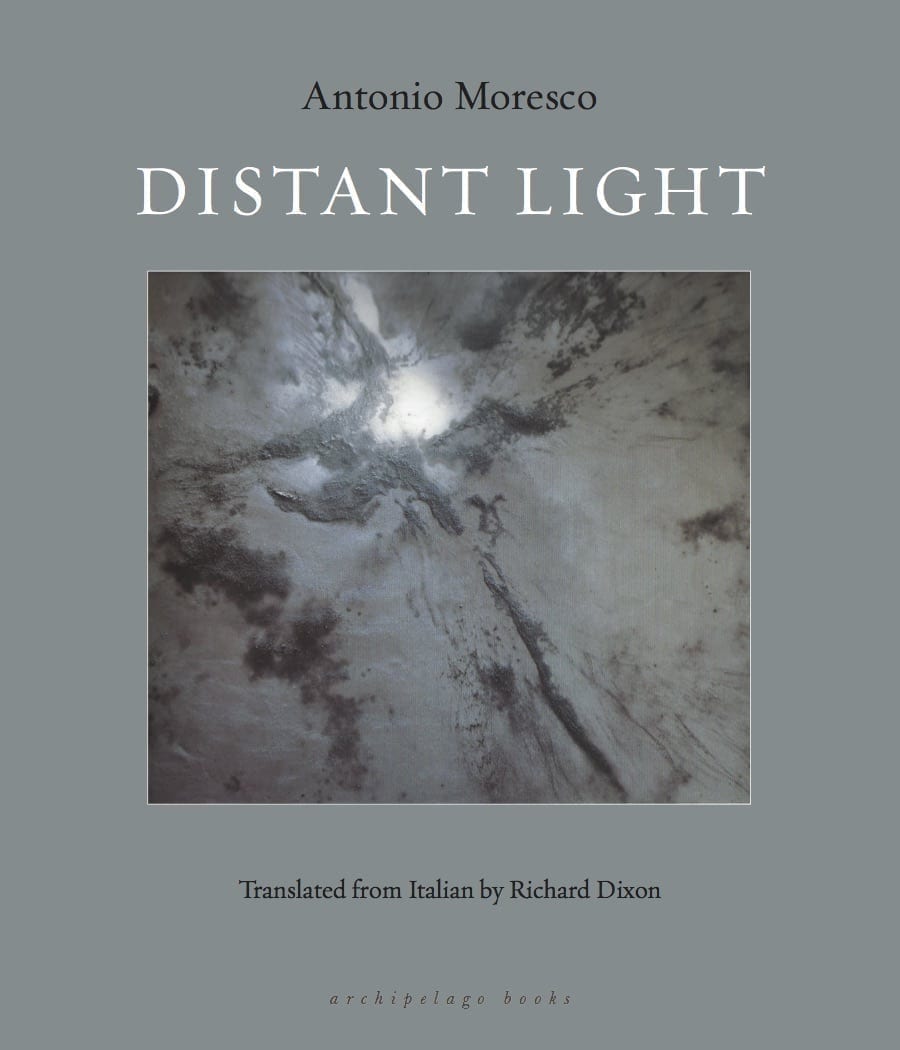Book Description
A man lives in total solitude in an abandoned mountain village. But a mystery disturbs his isolation: each night at the same hour a distant light appears on the far side of the valley. What is it? Someone in another deserted village? A forgotten street lamp? An alien being? Finally the man is driven to discover its source. There he finds a young boy who also lives alone in a house in the midst of the forest. But who really is this child? The answer at the secret heart of this novel is both uncanny and profoundly touching. Antonio Moresco’s work is a moving meditation on life and the universe we inhabit. Moresco reflects on the solitude and pain of existence, but also on what man shares with all around him, living and dead.
Halfway between fairy tale and science fiction, between religious and sacrilegious, between poetry and philosophy, this book by Antonio Moresco looks with careful but compelling insistence at the mystery of what happens in “the dark funnel” of a life and the very material that makes literature.
— Anna Ruchat, Pulp
It is a Canticle of the Creatures re-examined and modified with the eye of Galileo and the tragic vision of Leopardi, a prayer without religion but full of human religiosity. This small enchanting book is a modern De rerum natura of lyrical biology. Moresco is not only one of the greatest Italian writers, he is also the ultimate poet.
— Massimiliano Parente, Il Giornale
It is not the imitation of a classic, but a small classic in itself.
— Angelo Guglielmi, L'Unita
Despite its fable-like structure and brevity, Moresco has Kafka’s power to unnerve, and Walser’s genial strangeness. Something like a supernatural modernist story, Distant Light’s real territory is dreams, where readers may find the book’s imagery still lingering.
— Publishers Weekly
The imagery and language glow throughout. An unsettling and strangely tender novel.
— Kirkus Reviews
Antonio Moresco offers an otherworldly story of isolation
— Shelf Awareness
Distant Light is a dense and thoughtful book that should be lingered over, rather than burned through. It dwells on esoteric questions, but also provides unsettling insight into the darkest depths of the human condition, as well as a uniquely complex rendering of its polarity.— The Literary Review
It's wonderful [...] wonderful, Distant Light [...] it's a magnificent novel, so focused, and unique--totally unique, [Moresco's] writing is like no one else's.
— Daniel Pennac, La Grande Librairie
[Distant Light is] an anomaly in an age of fast-paced stories. Akin to Anais Nin’s sensual explorations in A Spy in the House of Love, Rilke’s The Notebooks of Malte Laurids Brigge, which limns depression, and Woolf’s attempts to capture the incandescence of existence, Moresco’s story delves into life and death, and the spaces that occur between the two.
— Terri Lewis, Washington Independent Review of Books
Distant Light is a meditation on the in-between state of existence, of death present in the living and the living in death.
— Nathaniel Popkin, Cleaver Magazine
"[Distant Light] is a poetic account of one man attempting to disappear and also find his place in an increasingly savage world...It’s a novel where questions are posed, and answers are rarely given...[it] should be read slowly in order to appreciate the poetic encounters of nature."
— The Birdcage Blog
"A short novel full of rich prose and symbolism and yet another example of the fantastic literature being produced by Italian authors over the past decade or so. “Distant Light” is a hard novel to describe — surreal, dense, probing — it’s the kind of novel that will keep you thinking about it long after you read it."
— Julian Gallo, Desvario
Translator Richard Dixon has done an excellent job of reproducing the simplicity and colloquial quality of Moresco’s prose. He’s unafraid to use verb contractions and stays neatly clear of cognates, leaving the text free of those Latinate words that so often sound too elevated or abstract in English translations from Italian. The strange, vaguely metaphysical import of the story is offset by the simplicity and clarity of the register, and he never betrays that.
— Frederika Randall, The Arkansas International
[A] profound philosophical meditation on life and death... Dixon’s translation works wonders in English, while preserving the text’s own magic... [W]e are introduced to another, unexpected, invisible realm within our midst, a realm essential to Moresco’s literary imagination. But to say more is to reveal the great mystery at the heart of this text. And it is a mystery to be savored and pondered.
— Stiliana Milkova, Reading in Translation

